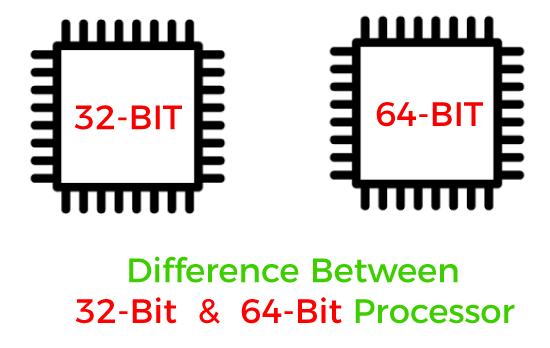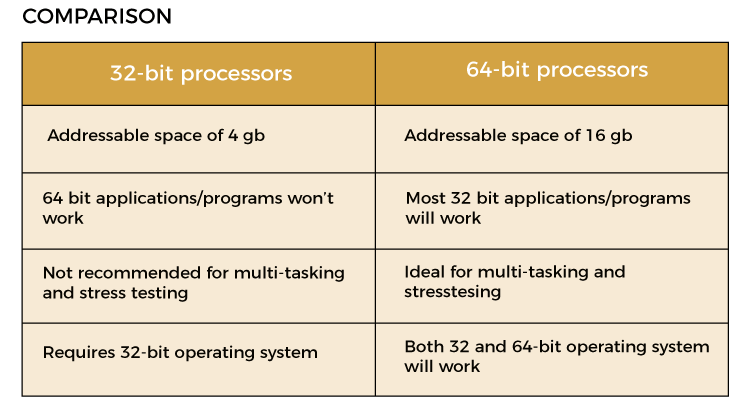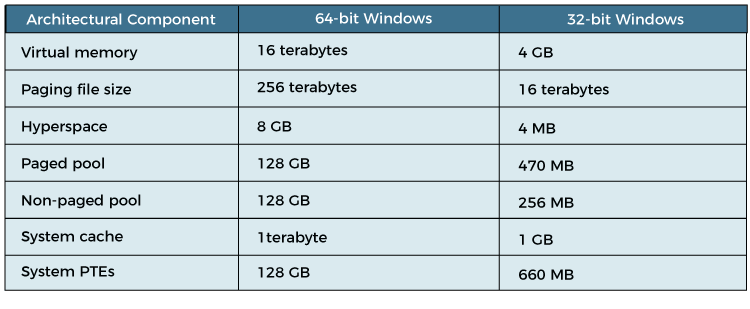Difference between 32-bit and 64-bit processors64-bit technology uses processors with varying data channels, lengths, integer sizes, and program memory. 32-bit integers, program memory, and data units are all utilized in a modern computer. They are a computer's core. Special software supports each of these designs, and selecting between them makes a difference. X86 or x86-32 are terms used to describe 32-bit hardware and software. X64 or x86-64 refers to 64-bit software. It also describes the driver and software application that uses specific architecture. Let's take a closer look at the more distinctions between 32-Bit and 64-Bit systems. 
It is critical to understand whether your computer is 32-bit or 64-bit to optimize its capabilities. The method for distinguishing 32-bit vs. 64-bit CPUs is dependent on the operating system used by the machine. It is simple to determine the type of CPU used by a computer. First, we'll go through the distinctions between the various types of processors. Processors are classified into two types: 32-bit and 64-bit. A computer system not only impacts its actual performance but may also affect the sort of software it runs. 32 BitIt is the percentage of information transferred or the number of bits that make up a data element. A 32-bit register can hold 232 values. The range is represented using a binary integer. One important implication is that an operating system with 32-bit memory addresses can only access up to 4 GiB of binary memory at a time. The IBM System/360 and IBM System/370, the System/370-XA, and the Intel x86 framework are all 32-bit editions. The 68000 series and Cold Fire, etc., are 32-bit assembly language architectures used in embedded Linux. 32-bit is used to describe the condition in which information is stored, received, and interpreted. When it comes to hardware and software, this refers to how many 1s and 0s are handled to represent your data. The more bits the computer can compute, the more information it can handle at the same time. Until about the early nineties, the 32-bit CPU was the predominant processor used in all systems. Intel Pentium CPUs and early Graphics processors were 32-bit. Benefits of a 32-bit CPU:
Restraints of 32-bit CPU:
64 BitsThe number 64 corresponds to the number of bits that may be processed or sent. The number utilized for individual components in structured data. It also refers to the term sizes used to define a computer design, storage, and CPU. The width of registration in a microcontroller is 64 bits. A 64-bit microprocessor can handle memory locations as well as data encoded by 64 bits. The term can also represent the dimension of low-level data formats, such as float-point figures of 64-bit. Microsoft produced a Windows XP 64-bit version for usage on 64-bit CPU systems. In a laptop format, the 64-bit shows 64-bit integer, ram address. Sixty-four bits tell the length of a register in microprocessors. The 64-bit device came from the IBM Super Processor IBM 7030 in 1961. Also available in 64-bit editions are Windows Vista, Microsoft 7, and Windows 8. 64-bit CPU major advantage:
64-bit CPU drawbacks:
Key Differences between 32 Bit and 64 Bit processor
The prominent options on the market are both 32-bit versus 64-bit. Let us talk about some of the main distinctions: There is a small quantity of RAM in a 32-bit CPU. It contains only 4GB. On the other side, 64-bit computers have greater access. It is vital to do this as the processor is built to access more RAM. A lot of multitasking is workable with the use of a 64-bit machine. Without any problems, the user can switch between the various programs. A 64-bit CPU may operate the increased and memory-consuming programs. Multitasking is slow in 32-bit machines. It controls a limited amount of RAM, 32-bit microprocessor systems are competent, and 64-bit processors may use far more. Unlike 32-bit Windows, which requires 1 GB of RAM, the least RM required for a 64-bit Windows OS is 2 GB. It is somewhat obvious because far more space is needed with larger registers. Dual-core, six-core, and 8-core editions for home computing are available to 64-bit CPUs. The multi-core 64-bit processors perform faster and with software packages that must perform many computations to be functioning. The significant difference is the rate at which they execute arithmetic programs per second. Integrating many computations provide an enhanced number of transactions per second. That can advance the processing capacity and aid to make a windows pc more. If you do not use 64-bit software, I should remind you that the 3D graphics application and games do not provide. Requiring any software for a regular computer, a 32-bit processor is enough. The video card upgrade will provide you far superior performance in computer games rather than a 64-bit computer. One thing to notice is that 3D graphics software and games do not gain much, if at all, from changing to a 64-bit machine unless the program itself is 64-bit software. A 32-bit computer is suitable for any software intended for a 32-bit CPU. The upgrade to the video card will increase you far more for games consoles than receiving a 64-bit processor. 
In-home computers, 64-bit CPUs are becoming prevalent due to decreased prices. More customers now use 64-bit systems and software, most companies manufacture PCs with 64-bit CPUs.
Next TopicDifference between
|
 For Videos Join Our Youtube Channel: Join Now
For Videos Join Our Youtube Channel: Join Now
Feedback
- Send your Feedback to [email protected]
Help Others, Please Share










